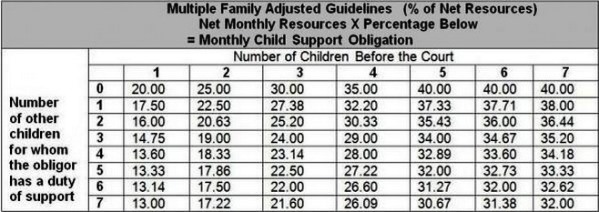Standard Possession Orders in Texas
The possession order for both mother and father in any divorce must be in the Best Interest of the child and the Court has specific guidelines it must follow if both parents refuse to agree to custody arrangements. The Managing Conservator has primary custody of the child and the Possessory Conservator has visitation but is not the primary custodian of the child. The guidelines set forth by the Court regarding custody for parents living 100 miles or less of each other and parents that reside over 100 miles from each other are listed in the Family Code § 153.312 and § 153.313.
Family Code § 153.312 Standard Possession Order, regarding parents who reside 100 miles or less of each other, states the Possessory Conservator will have the following rights:
- Have custody of the child throughout the beginning of the year at 6 p.m. on the first, third, and fifth Friday of each month and ending at 6 p.m. on the following Sunday.
- On Thursdays of each week during the regular school term beginning at 6 p.m. and ending at 8 p.m. unless the Court finds this is not in the best interest of the child.
- Custody of the Child for 30 consecutive days during the summer but the Possessory Conservator will be required to give written notice to the Managing Conservator by April 1st of each year specifying the extended period of possession for the summer. If Possessory Conservator does not give written notice on April 1st, then the Possessory Conservator shall have access to the child from 6 p.m. July 1st to 6 p.m. July 31st of each year.
Family Code § 153.313 Standard Possession Order, regarding parents who reside over 100 miles from each other, states the Possessory Conservator will have the following rights:
- Have custody of child throughout the beginning of the year at 6 p.m. on Friday of the first, third, and fifth weekend of each month and ending at 6 p.m. that Sunday. The Possessory Conservator may also elect an alternate weekend if he/she gives a 14-day notice either written or telephonic to the Managing Conservator.
- The visitations on Thursdays nights are not mandated under this section due to the distance between the two parents.
- Custody of Child for 42 consecutive days during the summer but the Possessory Conservator will be required to give written notice to the Managing Conservator by April 1st of each year specifying the extended period of possession for the summer. If the written notice is not given then the Possessory Conservator shall have access to the child from 6 p.m. on June 15th to 6 p.m. July 27th.
The Court shall follow these guidelines unless it is NOT in the Best Interest of the child. These guidelines are needed because of the contention between both parents and the common inability to find a middle ground when it comes to custody of a child. The Court may deviate from these standard Guidelines but only if a parent can prove by clear and convincing evidence that it is in the Best Interest of the Child. If these guidelines are unworkable because of the child’s schedule then the Court will make exceptions but attempt to keep the custody arrangements as close to the guidelines as possible. Custody issues can be vexing and straining on both parents. To ensure you receive a fair outcome to see your child, it is wise to seek an experienced attorney to ensure that the sacred right to see your child is not infringed.
Paternity in Texas – Is a Biological Father a Legal Father ?
A baby born to unwed parents does not have a legal father under Texas Law. In order to exercise your rights as a father, including visitation and possession, a man must be a child’s legal father. A common misconception is that if your name is on the birth certificate you are a legal father. If you are not married to the mother, simply putting your name on the birth certificate of your child is not enough to make you the “legal” father and you cannot enforce your rights to the child.
The process to become a legal father is a simple one. If the biological father and the mother agree, they can both sign an “Acknowledgement of Paternity” which is filed with the Bureau of Vital Statistics. Once paternity has been established, your name will be placed on the birth certificate, and the Court may order you to pay child support and grant you visitation or possession rights with your child.
TEXAS FAMILY LAW §160.301. ACKNOWLEDGEMENT OF PATERNITY
The mother of a child and a man claiming to be the biological father of the child may sign an acknowledgement of paternity with the intent to establish the man’s paternity.
TEXAS FAMILY LAW §160.302. EXECUTION OF ACKNOWLEDGEMENT OF PATERNITY
An acknowledgement of paternity must:
-
Be in a record;
-
Be signed, or otherwise authenticated, under penalty of perjury by the mother and the man seeking to establish paternity;
-
State that the child whose paternity is being acknowledged:
-
Does not have a presumed father or has a presumed father whose full name is stated;
-
Does not have another acknowledged or adjudicated father.
-
-
State whether there has been genetic testing and, if so, that the acknowledging man’s claim of paternity is consistent with the results of the testing;
-
State that the signatories understand that the acknowledgement is the equivalent of a judicial adjudication of the paternity of the child and that a challenge to the acknowledgement is permitted only under limited circumstances.
An acknowledgement of paternity is void if it:
-
States that another man is a presumed father of the child, unless a denial of paternity signed or otherwise authenticated by the presumed father is filed with the bureau of vital statistics;
-
States that another man is an acknowledged or adjudicated father of the child; or
-
Falsely denies the existence of a presumed, acknowledged, or adjudicated father of the child.
- A presumed father may sign or otherwise authenticate an acknowledgement of paternity.
Texas Child Support Guidelines Update
PLEASE READ UPDATE (2019)
Texas Child Support Guidelines Change-
Effective Sept. 1, 2019
Effective September 1, 2019 The Texas Child Support Division of the Attorney General increased the Maximum child Support under the Texas Child Support Guidelines from $8,550 to the “new cap”of net monthly resources to $9200 annually. This change in the law will increase the amount of maximum child support from of $1,710.00 to $1,840.00 monthly (20% of $9200. For one child)
CLICK TO READ MORE ON THIS UPDATE
PRIOR GUIDELINES
On September 1, 2013: Important Texas Child Support Guideline Changed!
The Texas Child Support Division of the Attorney General increased the “CAP” on net resources for purposed Child Support from the past amount of $7500 to be $8550, which became effective Sept. 1, 2013.
This “Cap Increase” affects any child support case filed or pending after September 1, 2013.
Under the Texas Family Code §154.125 the guidelines for Child Support are as follows:
(a) The guidelines for the support of a child in this section are specifically designed to apply to situations in which the obligor’s monthly net resources are not greater than $8,500 or the adjusted amount determined under Subsection (a-1), whichever is greater.
(a-1) The dollar amount prescribed by Subsection (a) above is adjusted every six years as necessary to reflect inflation. The Title IV-D agency shall compute the adjusted amount, to take effect beginning September 1 of the year of the adjustment, based on the percentage change in the consumer price index during the 72-month period preceding March 1 of the year of the adjustment, as rounded to the nearest $50 increment. The Title IV-D agency shall publish the adjusted amount in the Texas Register before September 1 of the year in which the adjustment takes effect. For purposes of this subsection, “consumer price index” has the meaning assigned by Section 341.201, Finance Code.
(a-2) The initial adjustment required by Subsection (a-1) shall take effect September 1, 2013. This subsection expires September 1, 2014.
(b) if the obligor’s monthly net resources are not greater than the amount provided by Subsection (a), the court shall presumptively apply the following schedule in rendering the child support order:
CHILD SUPPORT GUIDELINES
BASED ON THE MONTHLY NET RESOURCES OF THE OBLIGOR
- 1 child 20% of Obligor’s Net Resources
- 2 children 25% of Obligor’s Net Resources
- 3 children 30% of Obligor’s Net Resources
- 4 children 35% of Obligor’s Net Resources
- 5 children 40% of Obligor’s Net Resources
- 6+ children Not less than the amount for 5 children
Depending on the number of other children an obligor has a duty to support, the percentage of child support may be lower. For example, if the obligor was previously married and has 1 child to support in the previous marriage, the amount of support paid for one child before the court decreases to 17.50 percent. See the chart below.
Net resources are determined by deducting the following from the obligor’s income:
1. Social Security Taxes;
2. Federal Income Tax based on the tax rate for a single person claiming one personal exemption and the standard deductions;
3. State Income Tax;
4. Union Dues (if such deductions are being withheld); and
5. Expenses for Health Insurance Coverage for Obligor’s Child(ren) (if such deductions are being withheld).
Practice Areas
Times have changed and pre-concepts that Dads are the providers and Moms control the family have changed greatly! To raise well balanced children in today’s world, both Dad and Mom must be involved in raising the kids. Many times this is not possible since one parent refuses to give up control and causes many problems in the family structure.
Five of the biggest mistakes men make in a family legal action are: 1) failing to respond to the legal action itself; 2) obtaining incorrect legal advice (from friends and family rather than a legal expert); 3) signing a settlement agreement that is not in agreement with and later deeply regretting it; 4) failing to perform under the actual settlement agreement signed; and 5) getting frustrated and/or acquiescing to unreasonable demands and orders
Mark A. Nacol at The Nacol Law Firm PC, concentrates on difficult types of family legal Issues that seriously affect fathers and their relationships with their children and family. Mark addresses the concerns of clients throughout Texas in a wide scope of family law matters that include:
|
|
Divorce
In the United State every man, woman, and child has been affected, directly or indirectly, in family domestic issues. Many legal approaches exist for divorce, and whenever possible, the Nacol Law Firm P. C. and the Texas Family Courts favor out-of-court settlements. If relatively few issues are contested, workable alternatives to litigation include:
- Mediation — an informal process in which a neutral third party called a mediator listens and invites discussion on issues in conflict so couples can arrive at an understanding and reach agreements. Mediation is effective when both parties are willing to resolve differences regarding low-intensity disputes.
- Arbitration — a more formal alternative dispute resolution procedure in which a neutral third party called an arbitrator listens to both sides and renders a decision to resolve areas of conflict.
- Collaborative law —approach to divorce that focuses on common goals and seeks to arrive at fair, reasonable settlements that benefit the entire family.
Courtroom litigation generally is far more expensive, more time consuming than other alternatives and involves conducting discovery, interviewing witnesses and formally preparing and presenting the case at trial. Litigation should be reserved for contested divorces in which a trial is the only viable avenue to resolve intensely disputed issues and protect the client’s interests.
Divorce is granted when all issues involving children, property and support have been agreed upon outside of court or ruled on as a result of litigation. At The Nacol Law Firm PC, Mark A. Nacol represent clients in all approaches to divorce, tailoring his legal counsel to the method most appropriate for their needs. Click here for a Financial Checklist in preparation for your Texas Divorce:
Child Custody
The best interests of the children take priority in child custody matters. In most cases, Texas courts favor joint managing conservatorships, in which both parents share parenting rights and responsibilities. When the court rules on a joint managing conservatorship, one parent retains physical custody, meaning the children reside primarily with that parent, and the other parent is granted frequent, established times of possession. A sole managing conservatorship is another custody option in which one parent is granted most, if not all, rights for parenting decisions. Children need a father!
Child Support
Typically, when one parent has primary custody of the child or children, the other parent must provide child support. Texas courts follow child support guidelines under the Texas Family Code in determining child support payments. Many factors are taken into consideration, and calculating child support often is complex. Please see our Fathers Rights Blog for a current child support calculator form. Child support may be subject to modification when circumstances change after the divorce. To review Texas Child Support Guidelines
Parental Alienation
Parental Alienation Syndrome is the systematic denigration by one parent with the intent of alienating the child against the rejected parent. In most cases, the purpose of the alienation is to gain custody of the child and exclude involvement by the rejected parent. If you are experiencing this situation with your children and spouse, do not give up your parental rights! Your children desperately need you. Contact Nacol Law Firm PC for legal insight to your rights as a father. Parental Alienation and the impact on children
Domestic Violence
Every day in the news, we read how Domestic / Intimate Partner Violence affects women, men and children lives in very tragic ways. What is Domestic / Intimate Partner Violence? It is the willful intimidation, physical and sexual assault & battery or serious mental and verbal abuse perpetrated by one family member against another. Are you having these issues in your current relationship? Give us a call and we can help! Domestic Violence/ Intimate Partner Violence
Spousal Maintenance
In Texas, spousal support is granted under limited circumstances. Factors supporting an order of spousal support (when marriage has lasted 10 years or more) include a lack of earning ability, physical or mental incapacity or custodianship of a child that prevents employment. Domestic violence offenses are another consideration under which the court may grant spousal support. Spousal Maintenance Laws in Texas
Property/Business Division
As a community-property state, Texas requires property be identified as separate or marital before property division may be determined. Property division is based on “fair and equitable” guidelines as opposed to being equally divided between two spouses.
In today’s unpredictable economy there has been a continuing growth of small businesses and a substantial decrease of existing established businesses in Texas. In the regrettable instance of “Divorce” how may the “Family Business” be divided between a dissolving couple to reach a fair and reasonable result for both parties?
In such a situation, having an experienced Family Law Attorney with the aid of economic experts becomes critical in establishing a fair and equitable price on the business, consulting the client on their rights relative to the business, helping with negotiations for a business entity to be sold, transferred, or appraised, and making sure the client’s rights are protected in the transaction. Nacol Law Firm PC has a proven track record working with business owner during trying times.
Modification/Enforcement
Moves, paternity suits, career changes, new employment, unforeseen expenses and re-marriage are just some of the changes that occur after divorce. Most violations in divorce orders involve child support, custody and visitation. Such changes make modifications in child support, custody, possession and/or visitation necessary. Nacol Law Firm PC can assist you by ensuring that the terms and conditions of final judgments are modified and enforced through the courts.
Interstate Jurisdiction- Child Custody Disputes
Many states follow a uniform law regarding state jurisdiction in custody matters, known as the Uniform Child Custody Jurisdiction and Enforcement Act (UCCJEA), and other laws which make up custody jurisdiction law such as the Parental Kidnapping Prevention Act. Texas follows these statutes as well. The idea behind the UCCJEA is to minimize the potential difficulties in determining which of several states has jurisdiction in a matter. Generally, the state the child has been living in for the last six months will have jurisdiction over the matter.
There are a number of factors involved in determining which state to file in. Most likely, there will be only two states involved; but it is possible to have more than two states involved in cases where there is a frequent moving of the parties. Generally, any state in which any of the parties or the child has lived for the last year is a possible place to file an action.
At the Nacol Law Firm PC, we represent parents trying to enforce these laws; cases where we try to persuade courts to apply the specific, narrow exceptions to these general rules in order to have custody cases heard in the most convenient forum in which the most evidence is available; cases where the child’s home state or other basic questions need to be clarified; and cases where parents have been falsely accused of violating these laws.
Premarital & Post-Martial Agreements
By addressing ownership of assets and property, premarital and post-marital agreements assist couples in establishing their preferences for rights of possession as opposed to being subject to community-property laws. Marital agreements can be used for minimizing taxes, establishing guidelines on prior assets and debts, avoiding probate if a spouse dies or providing benefits for children from a previous marriage. Should the couple ever divorce, a pre- or post-marital agreement often lessens significantly the complexity of property division.
Paternity & Voluntary Legitimation
A baby born to unwed parents does not have a legal father under Texas Law. In order to exercise your rights as a father, including visitation and possession, a man must be a child’s legal father. In most cases, paternity can be effectively determined by DNA testing. Most disputes regarding child custody or child support sometimes revolve around establishing parentage. Texas Paternity: Is a biological father a legal father?
For more information on divorce and family law issues in Texas, from Dallas Family Law Attorney Mark A. Nacol, visit our blog or contact us today at (972) 690-3333
About Us

Based in Dallas, Texas, the Nacol Law Firm PC, traces its roots to the firm of Mark A. Nacol and Associates PC, established in 1979.
Extensive Legal Experience & Expertise
With an AV rating*, our firm is listed in the Martindale-Hubbell Bar Register of Preeminent Lawyers, which indicates the highest level of excellence, integrity and ethics as well as long-established client representation.
Our firm has expertise acquired from more than three decades of combined legal experience. We frequently handle larger, more complex cases than other firms of a similar size. While catering to the needs of small and large corporations, business professionals, and families, our doors are open to anyone seeking legal help. The Nacol Law Firm PC represents clients throughout Texas.
Operating Principles for Success
In-Depth Preparation. Diligent research and investigation of your case, thorough interviews of witnesses and a diligent review of evidence allow us to fully prepare each case. As a result, certain cases can be settled before filing lawsuits, while our firm settles others through negotiation or alternative dispute resolution. Whenever a case does go to trial, we have laid the groundwork to optimize your chances of success.
Commitment. We are committed to presenting our client’s case in the most effective manner possible, persisting in our efforts to obtain just and fair compensation. Hard work and dedication are the watchwords underpinning our endeavors, and we strive to exceed our client’s expectations.
Direct and Personal Attention. You will find your lawyer personally involved in all aspects of your case, aided by a competent, experienced legal support team. Our firm takes pride in being responsive. When you call about a legal matter or case status, you will speak directly with your lawyer or be accommodated promptly. Listening carefully to your concerns, your attorney is always supportive and keeps your best interests in mind.
The Nacol Law Firm PC is known throughout the Texas legal community, and, as a result, the majority of our cases are referred by previous satisfied clients as well as other attorneys.







